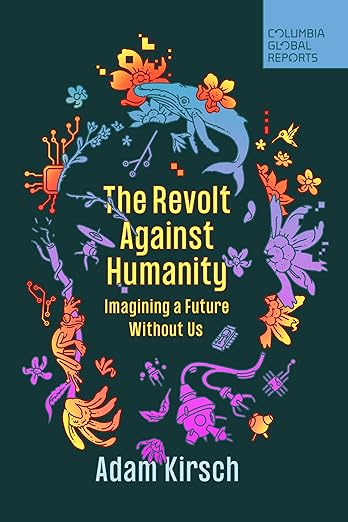The Revolt Against Humanity: Imagining a World Without Us
Adam Kirsch (Columbia Global Reports, $16, 99 pages)
 Adam Kirsch’s The Revolt Against Humanity is the best short introduction to the posthuman world imagined by futurists fascinated by the imagined combining of technology and humanity in what is called the singularity. He briefly lays out the literary, philosophic, and scientific literature that imagined the posthuman future in which mind and body are distinctly separate entities with a weird interest in preserving only the former, which they believe to be the essence of humanity. Kirsch delves into the dreams (nightmares?) of those who believed that mankind could achieve earthly transcendent happiness through technological tinkering (genetic manipulation, bionic additions, uploading of the human mind to machines) and how through both a technological procreation and synthetic living, people would overcome all natural, not to mention moral, rules. Kirsch also examines the antihumanism of the radical environmental movement. What Kirsch does uniquely and brilliantly is to show how two ostensibly opposing ideologies – the antihumanism of environmental catastrophizing and the transhumanism of the singularity – are, in fact, quite alike in one fundamental aspect: “they are worlds from which we (humans) have disappeared, and rightly so.” These are dangerous ideologies because they make “a similar appeal to people who are committed to science and reason” but also “yearn for the clarity and purpose of an absolute moral imperative.” While all of this may seem extreme or too bizarre to matter, Kirsch notes that the “revolt against humanity is beginning on the level of ideas” and that “a goal doesn’t have to be reached, or even reachable, to have a major impact on the human future.” There is no shortage of policies one can point to to illustrate that the “moral primacy of human beings” has been, at the very least, diminished, if not yet totally obliterated.
Adam Kirsch’s The Revolt Against Humanity is the best short introduction to the posthuman world imagined by futurists fascinated by the imagined combining of technology and humanity in what is called the singularity. He briefly lays out the literary, philosophic, and scientific literature that imagined the posthuman future in which mind and body are distinctly separate entities with a weird interest in preserving only the former, which they believe to be the essence of humanity. Kirsch delves into the dreams (nightmares?) of those who believed that mankind could achieve earthly transcendent happiness through technological tinkering (genetic manipulation, bionic additions, uploading of the human mind to machines) and how through both a technological procreation and synthetic living, people would overcome all natural, not to mention moral, rules. Kirsch also examines the antihumanism of the radical environmental movement. What Kirsch does uniquely and brilliantly is to show how two ostensibly opposing ideologies – the antihumanism of environmental catastrophizing and the transhumanism of the singularity – are, in fact, quite alike in one fundamental aspect: “they are worlds from which we (humans) have disappeared, and rightly so.” These are dangerous ideologies because they make “a similar appeal to people who are committed to science and reason” but also “yearn for the clarity and purpose of an absolute moral imperative.” While all of this may seem extreme or too bizarre to matter, Kirsch notes that the “revolt against humanity is beginning on the level of ideas” and that “a goal doesn’t have to be reached, or even reachable, to have a major impact on the human future.” There is no shortage of policies one can point to to illustrate that the “moral primacy of human beings” has been, at the very least, diminished, if not yet totally obliterated.




